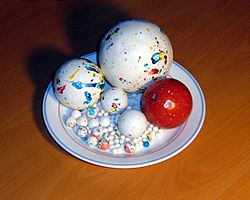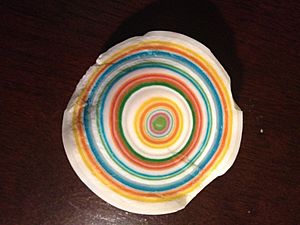Gobstopper facts for kids

Gobstoppers of various sizes and colours. The largest one is 3 inches (~7.5 cm) in diameter
|
|
| Alternative names | Jawbreaker, Jawbuster |
|---|---|
| Type | Confectionery |
| Place of origin | United Kingdom |
| Main ingredients | Sugar |
Gobstoppers, also known as jawbreakers in the United States, are a type of hard candy. They are usually round, and usually range from 1 to 3 cm (0.4 to 1.2 in) across; though gobstoppers can be up to 8 cm (3.1 in) in diameter.
The term gobstopper derives from "gob", which is slang in the United Kingdom and Ireland for mouth. The sweet was a favourite among British schoolboys in the first half of the twentieth century.
Gobstoppers usually consist of a number of layers, each layer dissolving to reveal a differently coloured (and sometimes differently flavoured) layer, before dissolving completely. Gobstoppers are too hard to bite without risking dental damage (hence the name "jawbreaker").
Gobstoppers have been sold in traditional sweet shops for at least a century, often sold by weight from jars. As gobstoppers dissolve very slowly, they last a very long time in the mouth, which is a major factor in their enduring popularity with children. Larger ones can take days or even weeks to fully dissolve.
Manufacturing
Gobstoppers are made by slowly depositing layers onto a core (such as a pressed ball of sugar or a gumball). Gobstoppers are made in large, rotating, heated pans. This is called "hot panning". The candies take several weeks to manufacture, as the process of adding liquid sugar is repeated multiple times. Natural and artificial colours and flavours are also added during the panning process.
Everlasting Gobstoppers
The Everlasting Gobstoppers, sold under Nestlé's Willy Wonka Candy Company brand, were first introduced in 1976 by Breaker Confections, and are named after the Everlasting Gobstoppers in Roald Dahl's children's book Charlie and the Chocolate Factory. In Dahl's story, Everlasting Gobstoppers are purported to last forever. Dahl named the sweet after Gobstoppers, which were a favourite among British schoolboys between the two World Wars.
Images for kids



